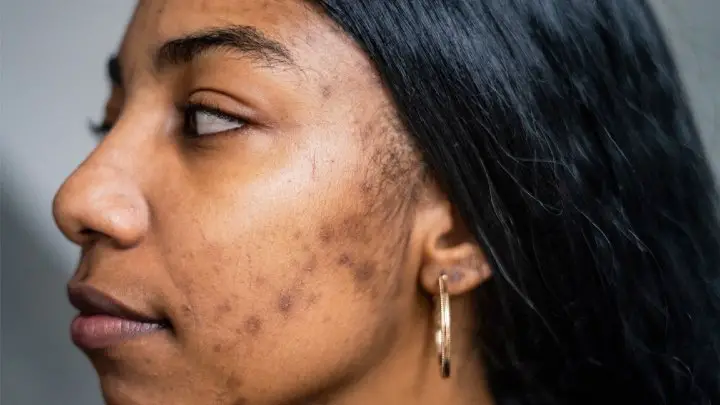This is a question that I get asked a lot, so I wanted to address it in this article.
The short answer is yes. In addition to improving skin tone and texture, niacinamide can also help with acne and acne scarring.
Keep reading to know how niacinamide helps with acne scarring, how long it takes to show results, how to use it in your skincare routine, and much more.
Does niacinamide help with acne scarring?
Yes, niacinamide does help with acne scarring.
Niacinamide is a form of vitamin B3 that has been shown to be effective in reducing the appearance of acne scars. It works by stimulating the production of collagen, which helps to repair and rebuild damaged skin tissue.
Niacinamide also reduces the inflammation and redness associated with acne scarring. Additionally, studies have shown that niacinamide can improve the skin’s barrier function, making it better able to heal scars and prevent environmental damage.
For best results, you should use niacinamide in combination with other acne treatments, such as retinoids and exfoliants. With continued use, niacinamide can help to reduce the appearance of acne scarring and improve the overall health of your skin.
How long does it take for niacinamide to fade acne scars?
The amount of time it takes for niacinamide to fade acne scarring depends on the severity of the scarring and the strength of the niacinamide product.
Generally, it can take anywhere from 6 to 12 weeks to see noticeable improvement, although some people may experience results sooner or later than that.
To get the best results, it’s important to use niacinamide consistently and as directed by your doctor. It’s also important to protect your skin from the sun while using niacinamide, as it can make skin more sensitive to the sun.
How do you use niacinamide to fade acne scars?
- Cleanse and tone your face. This will ensure your skin is free from all makeup and dirt, allowing the niacinamide to penetrate deeply.
- Apply your niacinamide product. Massage it into your skin, focusing more on areas where you have acne scarring.
- Apply a moisturizer. This will help lock in the niacinamide and provide an extra layer of hydration to your skin.
- Follow up with sunscreen. Applying sunscreen during the day will help protect your skin from the sun’s harmful rays.
Repeat this process twice a day for the best results. With consistent use, you should begin to notice smoother, brighter skin in as little as six weeks.
What heals acne scars fast?
Several treatments can help to heal acne scars fast.
One of the most popular treatments is laser resurfacing, which uses a laser to remove the top layers of skin and stimulate collagen production. Chemical peels can also be used to reduce the appearance of acne scars by removing the top layers of the skin.
Other treatments include dermal fillers, which use hyaluronic acid to fill in acne scars, and platelet-rich plasma, which uses platelets from the patient’s own blood to promote healing.
It’s important to remember that these treatments may take some time to show results, so patience is key. Talk to a dermatologist to find out which treatment is right for you.
How do you fade acne scars naturally?
If you’re looking to fade your acne scars naturally, there are a few things you can do
The first is to use lemon juice. Lemon juice is a popular natural bleaching agent that you can use to fade acne scars and even out the skin tone.
To use lemon juice as a remedy for acne scars, mix equal parts lemon juice and water and apply it to the desired area with a cotton ball. Leave the mixture on for 10-15 minutes before rinsing it off with warm water.
Baking soda is also known for its ability to fade scars. To use it, mix one tablespoon of baking soda with two tablespoons of water to form a paste. Apply the paste to the affected area and leave it on for 10 minutes before rinsing it off with water.
Finally, you can try using natural oils like coconut oil. To use coconut oil to fade acne scars, simply massage it into the affected area in circular motions. Leave the coconut oil on for 10-15 minutes before rinsing it off with warm water.
FAQs

What are the side effects of using niacinamide?
The side effects of using niacinamide include dryness, redness, and irritation of the skin, as well as increased sun sensitivity. In some cases, niacinamide can also cause inflammation or burning sensations.
It’s important to use your niacinamide product according to your doctor’s directions, as overuse can increase the risk of side effects. If you experience any side effects, stop using the niacinamide product and consult your doctor.
Is niacinamide good for saggy skin?
Yes, it is.
Niacinamide is effective at treating a variety of skin concerns, including wrinkles, acne, and hyperpigmentation. So, if you’re looking for an effective over-the-counter treatment for your saggy skin, niacinamide may be worth trying.
How often should a beginner use niacinamide?
Every 2-3 days.
For beginners, niacinamide should be used every 2 to 3 days for best results. However, if you have sensitive skin, start with once a week and increase frequency as your skin gets used to this ingredient.
Is 10% niacinamide too much?
No, it is not.
However, most experts caution that using a high concentration of niacinamide can lead to side effects such as dryness, redness, and irritation. In most cases, these side effects are temporary and will go away once you stop using the product.
If you’re considering using niacinamide in your skincare routine, it’s best to start with a lower concentration and increase it gradually over time. This will give your skin time to adjust to the product and minimize the risk of developing any adverse reactions.
How do you know if niacinamide is working?
Your skin tone is more even.
If you’ve been using niacinamide for a few weeks and your skin tone looks more even, then that’s a sign that it’s working.
Niacinamide can also improve the texture of your skin, making it smoother and softer. So if you’ve noticed a difference in the way your skin feels, that’s another sign that niacinamide is working.
Conclusion
Niacinamide is a great ingredient for treating acne scarring and there’s evidence to confirm it. This form of vitamin B3 works by stimulating collagen production, reducing redness and inflammation, and improving the skin’s barrier function.
With regular use, niacinamide can help reduce the appearance of acne scars and improve the overall look of your skin. For best results, use it in combination with other acne treatments and always apply sunscreen.
Thanks for reading.
Visit Serum101 for more information on niacinamide and how it can help reduce the appearance of various skin concerns.







